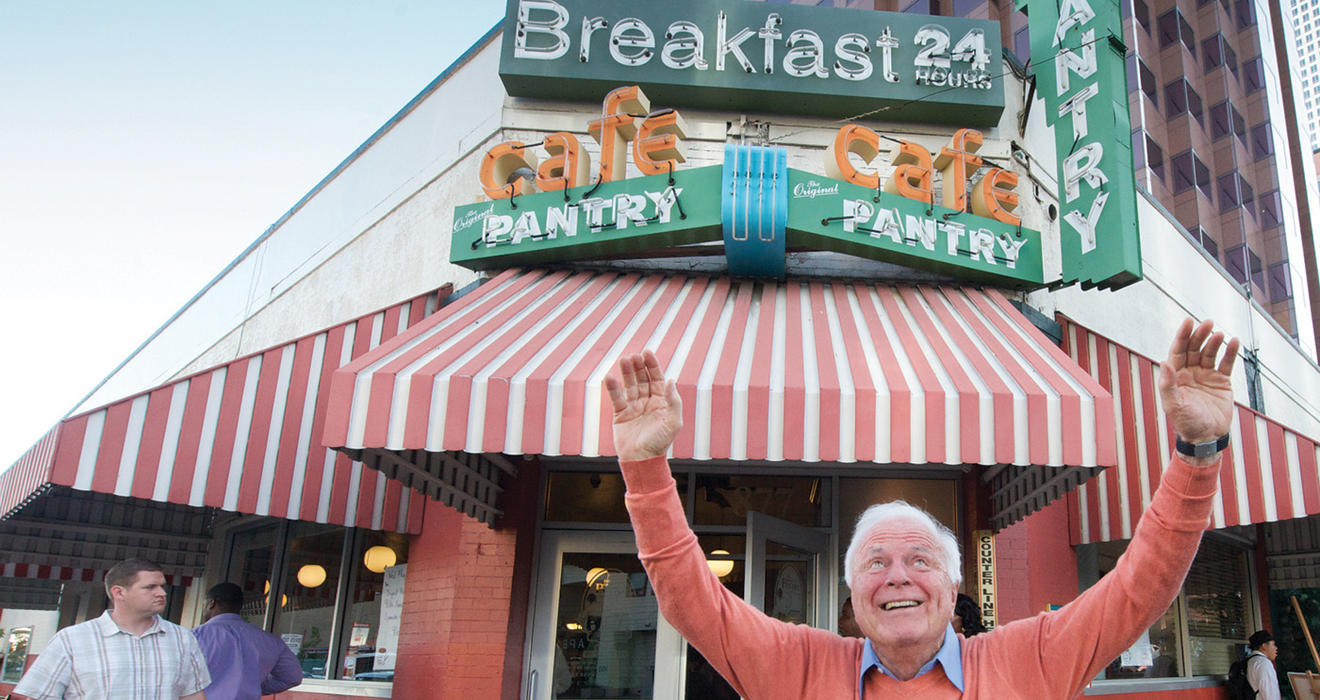
May 1, 1930 — April 19, 2023
Once upon a time, there was a country in which a Republican businessman could get elected mayor of Los Angeles.
The man, Richard Riordan ’52, not only served two terms leading the country’s second-largest city (1993 to 2001), he did it while winning significant support from a range of constituencies: 43% of Latino voters, 31% of Asian voters, and 28% of LGBTQ voters cast ballots for him in his first race. In today’s hyperpolarized electorate, such an outcome may seem like a fairy tale, but a unique set of circumstances made it possible. Riordan was the first Republican mayor of Los Angeles in 36 years (although the office is technically nonpartisan) and the most recent.
Though today he might be dismissed as a RINO (Republican In Name Only), Riordan was a hard man to pigeonhole. He was also a venture capitalist, philanthropist, restaurateur, bon vivant, and bibliophile. The central library in Los Angeles was renamed for him. While mayor, he started a book club with science-fiction writer Ray Bradbury and Los Angeles Times columnist Patt Morrison, which met monthly for more than 25 years. After meetings, the group would often repair for a drink to Riordan’s two-story personal library, which he built to house his collection of more than 40,000 books.
Born in Queens, the youngest of nine children, Riordan attended Santa Clara University before transferring to Princeton, where he majored in philosophy and joined Terrace Club. Riordan served in the Army during the Korean War, then, after law school at the University of Michigan, joined a large firm in Los Angeles. He later founded his own firm.
He was also a keen investor, turning an $80,000 inheritance into a fortune worth tens of millions.
Civically active, Riordan served on several city boards and led an effort to oust liberal State Supreme Court Justice Rose Bird. But he also loaned hundreds of thousands of dollars to Democrat Tom Bradley’s 1982 gubernatorial campaign.
Riordan succeeded Bradley as mayor in 1993 when Los Angeles was reeling from the Rodney King riots. He spent $6 million of his own money on the campaign, presenting himself as a law-and-order fiscal conservative and running on the slogan, “Tough Enough to Turn L.A. Around.” He was elected with 54% of the vote, and later reelected with 61%.
“I think there was a sense that we needed someone who was a tough guy,” recalls Morrison, “which is funny because personally, apart from business deals, he was just a softie.”
His mayoral successes included pushing for completion of Walt Disney Concert Hall, reforming the city charter, and leading recovery efforts after the 1994 Northridge earthquake. His most notable failures were a police corruption scandal and a discrimination suit against the city’s transportation system.
By current Republican standards, Riordan was a moderate who supported reproductive choice, immigration, and gay rights. In 2000, he endorsed both George W. Bush for president and Democratic U.S. Sen. Dianne Feinstein for reelection. “The more you study Dick Riordan, the more you can’t define him,” the L.A. Times wrote shortly after his election. “Mixed signals beam from him like a scrambled cable channel that will not tune in.”
He also possessed what the paper called a “Swiss cheese-like memory for detail” and a penchant for malapropisms, such as the time he defended his proposal to lease LAX airport to a private firm, saying, “I feel very confident I’m wrong.” Personal controversies also caused him political headaches, such as the revelation that he had been arrested three times for drunk driving as a young man.
Term-limited as mayor, Riordan ran for governor in 2002, losing the GOP nomination to a much more conservative candidate. He returned to public service as state education secretary from 2003 to 2005 under Gov. Arnold Schwarzenegger.
But he had much else to do. Once, while dallying over a book in a restaurant, the waiter suggested that Riordan go to the library if he wanted to read. Instead, Riordan bought the restaurant, and later opened several more.
His life was also marred by tragedy. Three of his siblings died in horrible fashion and two of his five children, from four marriages, died before the age of 22.
“Dick combined noblesse oblige with a Catholic sense of duty,” Morrison says. “He knew what suffering was.”
Mark F. Bernstein ’83 is PAW’s senior writer.






No responses yet